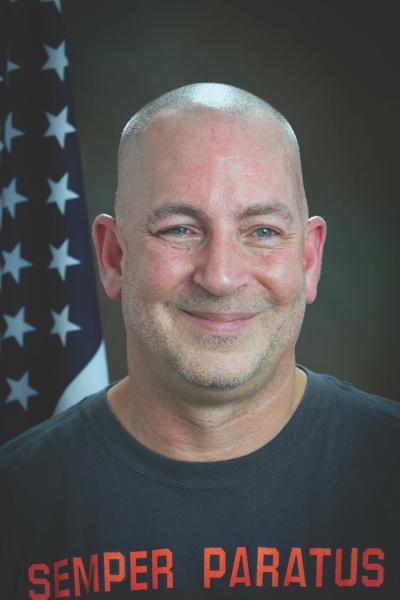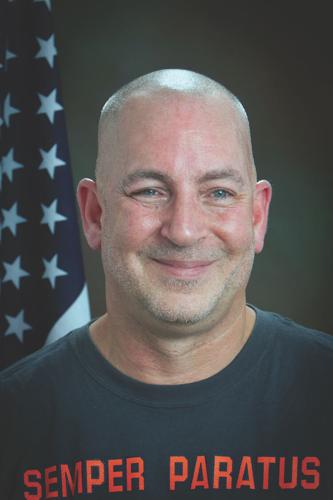The son of a Navy veteran and grandson to a World War II Coast Guard veteran who served in the Pacific Theater, Michael Tapp found the idea of military service familiar.
“I found a photo of my grandfather in uniform with his rifle standing next to Japanese flag that clearly had been taken during the war,” Tapp said.
“I carried that photo with me through my entire Coast Guard career. It wasn’t until after I had enlisted into the Coast Guard, I learned my mother’s stepbrother also served in the Coast Guard in Korea and Vietnam. That is when I realized I am a third-generation Coast Guard veteran.”
Tapp will honor his family and others in the military who have died at the Memorial Day ceremony at 9 a.m. Monday, May 30, presented by the VFW Post 12031, the American Legion Post 128 and the Daisy Mountain Veterans with support from the Anthem Community Council. Tapp will serve as master of ceremonies.
Early years
Tapp’s early years were spent in Dallas, but in the eighth grade his family moved to Washington, D.C.
“I think that is where my true appreciation for our government began,” he said.
“I had a stronger sense of patriotism living in D.C., as all my classmates and friends came from families who worked in the military or some other part of our government. Serving our country, in some capacity, was just part of me.”
In high school, Tapp’s first career goal was to enter federal law enforcement. Unsure of how to do that, he asked a family friend for guidance. Because it was difficult to be hired without prior law enforcement experience, the friend suggested the best way to get experience was to serve with the Coast Guard.
“I enlisted immediately.”
College years
After his first four years in the Coast Guard, Tapp decided he needed to add to his resume. After acceptance into North Virginia Community College and then George Mason University, he left active duty and shifted to the Coast Guard reserves.
While in school, he took a job for Hilton Hotels and, within a couple years, was head of security. He quickly advanced to a general management position.
Just as his civilian career was taking off, his family obligations became a priority and Tapp shifted from active reserve to inactive reserve status. But, like so many other Americans, life changed on Sept. 11, 2001.
“A family friend was one of the 125 military and civilians who died in the Pentagon attack that day,” Tapp said.
“That event lit a fire under me. I was so infuriated and decided I needed to again contribute. As the smoke of the Twin Towers rose, I volunteered to return to active duty.
“After 9/11, I was sent to Michigan to assist with border patrol between Canada and the United States. I served as the operations officer to the Coast Guard station there. The U.S. government was conducting rapid assessments of threats to the Great Lakes shipping, critical to moving supplies. We helped protect against potential infrastructure threats at the Blue Water Bridge (in Port Huron) and served as armed escorts for the tankers.”
Tapp recalled the more terrifying missions on the Great Lakes.
“The Great Lakes can be one of the harshest places to conduct rescue missions,” he said.
“The storms roll up quickly and, unlike the ocean tides where waves roll to the shores and dissipate, on the Great Lakes the waves hit the shores and reverb back, causing a ‘confused sea.’
“During rescues on the Great Lakes, it can be like riding a roller coaster without rails in monster seas.”
He said five kids flipped a sailboat at the head of the St. Clair River, just where it shifts from Lake Huron. Tapp could not see the kids, but he knew they were there.
“After we pulled all five of them out of the water and got them safely back to shore, I knew I was meant to do this forever,” he said.
Transferred out East
From the Great Lakes, Tapp was transferred to Chesapeake Bay, where he assisted in search-and-rescue missions, law enforcement boardings and protect the fishing and crabbing communities against illegal fishing and drug crimes.
Early in his days on the Chesapeake Bay, a shrimp boat ran aground during a storm.
“The boat was stranded on a sand bar, and taking on water and our motor lifeboat couldn’t get close enough to rescue them,” Tapp said.
“I got on one of our smaller boats and headed in to help them dewater their boat so they could get off the sandbar. But, every time a wave came under the boat and raised it off the sandbar, it rolled back and the stranded boat hit the bottom harder, breaking up the hull even more.
“After hours of trying to get the boat dewatered, I knew it was going to go down and I was going with it. Something had to change. So, I told the captain he had to push the throttle the next time the wave took us up to get us off that sandbar. He was frozen in fear, and I feared I would die there with these men. I pushed him off the helm and took over. By some act of God, the engines started, and when the next wave took us up, I hit the throttle forward. After hours, we finally got to where the Coast Guard boat was waiting for me. They threw us a line and towed us to the pier. Twenty minutes after we got to the pier, the boat sank.”
From there, Tapp was sent to Hawaii, where he served aboard his first large Coast Guard ship and set off to patrol the Pacific Ocean and Bearing Sea.
“Our responsibilities in this area were substantial, especially given the miles of ocean we were patrolling,” Tapp said.
“We spent a lot of time patrolling the U.S. and Russian maritime boarder, basically running parallel to Russian ships to enforce the boundary line and ensure they stayed and fished on their side.
“While in the open Pacific, we often stopped and boarded Chinese vessels for inspection, as they were illegally fishing and sometimes involved in state supported terrorism activities. In one case, we chased a 1,000-foot tanker in a 21-foot Coast Guard motorboat. After boarding the ship, we found the crew was involved in drug smuggling and human trafficking, among other crimes. We were the first Americans to seize a Chinese-flagged vessel in international waters under modern maritime law enforcement agreements.”
Later in his career, Tapp worked with federal law enforcement teams to stop drug cartel activity, which often involved submarines and high-speed boats.
“Anything we can do to stop these drugs from entering the United States greatly affects pricing and slows the market. Working in this capacity reminded me I was part of something much larger than I could have imagined,” he said.
One of Tapp’s last assignments was in San Diego, where he was appointed the officer in charge of an aids-to-navigation unit in the San Diego Bay.
“Basically, I was the lighthouse keeper for the San Diego Bay, charged with maintaining the buoys, navigation lights and Point Loma lighthouse,” he said.
“While there, I took some flak from residents for rapidly advancing the Coast Guard energy-saving strategy by changing the lighthouse light beacon to LED. A lighthouse lantern is a sweeping, spinning light, one with which every person on a coast is familiar; it is a nostalgic, even romantic, light that has brought sailors and fisherman home to their families for generations. Getting the acid batteries out of the buoys and shifting to a more economic, long-lasting lighting system just made sense, but the new pulsating light in the lighthouse took a while for people to accept.”
Switching assignments
After a 27-year career in the Coast Guard, Tapp retired and entered the civilian workforce, taking a position with the judicial branch of Arizona.
“I use all my Coast Guard training, law enforcement and management skills in threat assessment and emergency management. It really is an honor to work on my new team,” he said.
Tapp lives in Anthem with his wife, Laura, a kindergarten teacher at Gavilan Peak, and their children.
“We love living in Anthem,” he said.
“It has a great sense of community and demonstrates an even greater respect for veterans. The Anthem Veterans Memorial is the very first place we take our guests, especially those who served. Having such an amazing tribute to veterans is an indescribable value to veterans; it shows people really do support us.”
Tapp paused as he is reminded of another memory.
“On Memorial Day, we all pause to remember those veterans killed in action and missing in action. There isn’t a day that goes by that I don’t remember Senior Chief Petty Officer Terrell Edwin Horne III.”
Horne was in the Coast Guard for 14 years and was second in command of the Marine Protector class cutter, USCGC Halibut.
On Dec. 12, 2012, he was aboard the Halibut’s high-speed water-powered pursuit boat, sent to intercept drug smugglers. When the drug smugglers were ordered to heave to, the smugglers instead rammed Horne’s boat. After he pushed the coxswain out of the path of danger, Horne was struck on the head by their propeller.
On July 30, 2014, Commandant Paul Zukunft announced the Coast Guard would name a Sentinel class cutter after Horne, “a hero.”
Tapp reflects a moment longer and said, “All of us who serve, whether it be in the past or present, take pause on Memorial Day to remember those whom we have lost and we pray for those who serve. I will be at the Memorial Day ceremony at the Anthem Veterans Memorial this year as I have in the past and will in the future. It is the least we can do for these veterans.”


